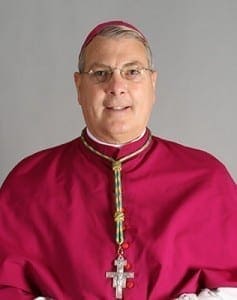Washington, DC
Bishop Hartmayer impacted by pope’s history lesson
By ANDREW NELSON, Staff Writer | Published October 2, 2015
WASHINGTON—Savannah Bishop Gregory Hartmayer, OFM Conv., watched Pope Francis speak from the House of Representatives visitors’ gallery, to the left of the podium. He was given the ticket to the historic Sept. 24 address by his congressman, U.S. Rep. Buddy Carter.
“As an American citizen and as an American bishop, I was extremely proud to see our pope walked into the halls of Congress to a warm and enthusiastic reception by the full Senate and House of Representatives. They immediately came to their feet and there were even some shouts of welcome,” the bishop said.
The speech used American history to point out key values.
“It was written by a master. He pointed out four outstanding Americans he wanted to recognize,” Bishop Hartmayer said, including Abraham Lincoln and Martin Luther King Jr.
The other two he spoke of, Dorothy Day and Thomas Merton, were adult converts to the Catholic faith.
The speech was to the lawmakers, but the pope also directed remarks to the elderly, with their “storehouse of wisdom” and the young “who are dreaming,” said Bishop Hartmayer.
He recalled how both Day and Merton joined the faith as adults, after turbulent lives. In addition to the communion of saints, the pope is holding up these four who have also contributed to our country, he said, in pursuit of liberty, the dream of equal rights, justice for the poor, and dialogue for peace. The point is to look to the past for models for the future, he said.
“He made me realize the importance of our own history. They made such a valuable contribution to our society.”
The bishop also was touched by the pope’s encounter with the tens of thousands waiting to greet him outside the Capitol. Standing on a balcony, the pope asked people to pray for him, but if they cannot pray, he asked for their good wishes, Bishop Hartmayer said. He called it “another way of inclusion.”
“Everyone can send a good wish,” he said.
